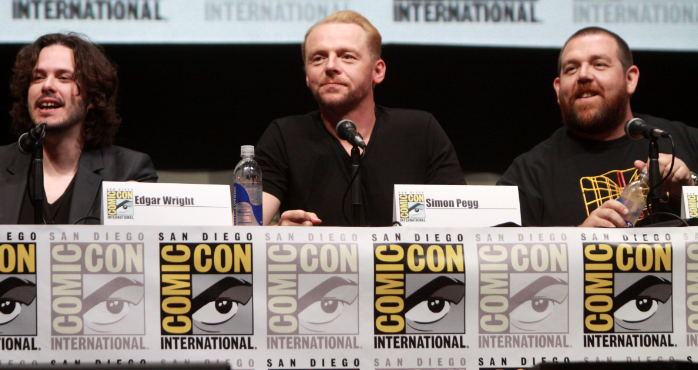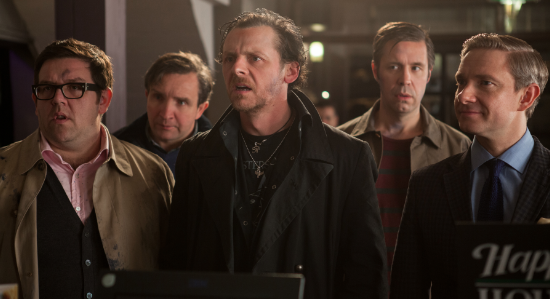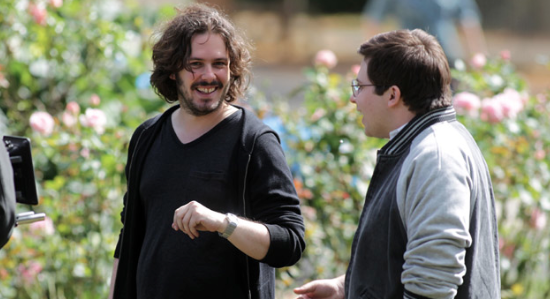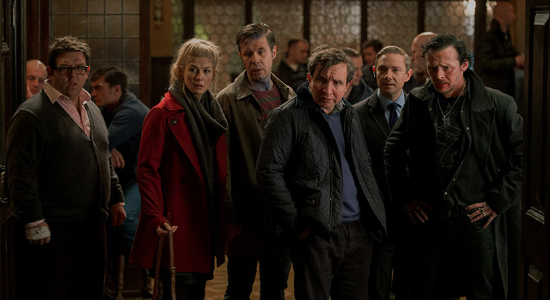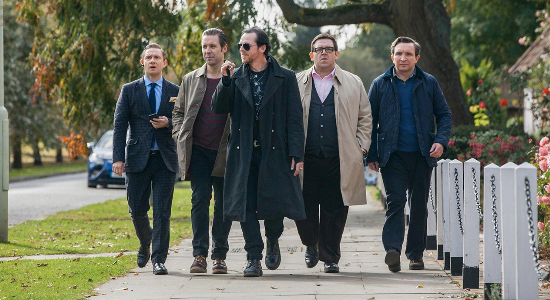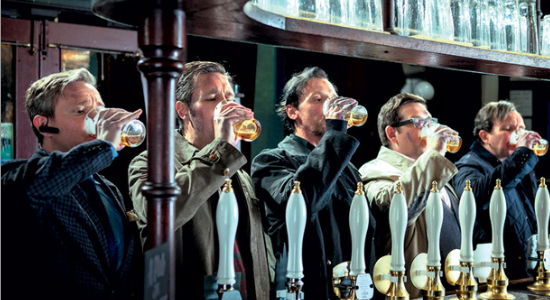This weekend Edgar Wright, Simon Pegg, and Nick Frost wrap up their Three Flavours Cornetto Trilogy with The World’s End, a cocktail comprised of one part alien invasion/takeover riff and two parts mid-life crises.
After nearly a decade, it’s a little bittersweet to see this unexpected series come to a close; I could wax eloquent for hours on my fond memories of watching Shaun of the Dead on the region-free DVD player I kept in my dorm. But then, maybe I’d be falling into the trap of nostalgia like some of the characters in this very film, a cautionary tale about how you quite literally can never go home again, so perhaps I’m better off embracing the capstone Cornetto picture rather than looking over my shoulder at the genre-driven movies that precede it.
I recently had the opportunity to sit down for a round table chat with Edgar, Simon, and Nick, as well as six of my fellow Boston-area critics and journalists – Lucien Flores from The Daily Free Press, Matt Anders from Sumo Skinny, Greg Vellante from The Eagle Tribune, Bob Chipman from The Escapist Magazine, Jesse O’Brien from Boston Event Guide, and Jaskee Hickman from The Movie Picture Show – to discuss The World’s End specifically, as well as the trilogy in total, the pros and cons of homogenization, and what it takes to write and shoot a movie in the first place. But you’ll have to read on to find out more for yourselves.
Andy Crump: I know that you cited John Wyndham and Samuel Youd as influences for this film, and as you watch it you can see the elements of Invasion of the Body Snatchers in there, but I wondered what other sources inspired the writing and the production while you were shooting the film?
Simon Pegg: Well, this wasn’t Hot Fuzz where we sat down and kind of re-acquainted ourselves with the language of a certain kind of film, because really Hot Fuzz was about action cinema to a degree and how it contradicts the reality of policing. But with this, we kind of felt like we didn’t want to have anything in our heads that we would make a specific reference to. We watched a Gene Kelly musical called It’s Always Fair Weather, and we watched The Big Chill because it amused us that the pitch for the movie was, ‘it’s like The Big Chill with the corpse at the party’. So, you know, the stuff that we drew on, I guess, was probably more subconsciously from our own lives watching science fiction.
Edgar Wright: Yeah, I think that was almost the idea with this one, that we wanted to do something like the older sort of sci-fi films where the threat is a metaphor, and the film is essentially about the idea of your hometown kind of being homogenized and changed beyond all recognition without you present. So, that absolutely lends itself to the quiet invasion genre. There’s a scene in the movie where when Simon’s character realizes that there might be otherworldly forces present, and he’s actually happy, because we figured he would be happier with that conclusion than being accepting getting old and that the town has kind of changed for the worse. He’s happier with the idea of the alien invasion. And in a sense, I think that’s something that, in a way, you don’t want to deal yourself with the passage of time , because it’s very bittersweet to see that change. That was the idea of it really.
Lucien Flores: I’d like to ask about the writing process, especially for you Simon, because you’ve written features with Nick and you’ve written features with Edgar. I’m wondering how the creative process is different when you’re writing with one or the other.
Simon: Well, Edgar and I sort of set up…you know, Shaun of the Dead was our first film, so we sort of felt our way with that one and we read a lot of books about screenwriting to see if they held up. We applied favorite films of ours to certain scriptwriting models to see if it wasn’t a lot of, you know, scientific nonsense, and we actually discovered that certain techniques were absolutely valid in terms of structure. We kind of found our way with that so when we wrote Hot Fuzz, we were able to do it again, and when Nick and I wrote Paul, we kind of worked on a model of what Edgar and I had sorted out. Nick and I were slightly more inclined to go to the cinema; if we wrote a good joke in the morning, we would take the day off.
But yeah, we kind of always sit in the same room and we try never to write long-distance. There’s a lot of discussion, a lot of debate. When it comes to ideas you might not agree on, we always find a synthesis of that. We start big, we write things on a flip chart or index cards, and that eventually comes down onto the written page, and the written page is then honed and honed until it’s the kind of essence of what we want. I guess the experience of writing with both of them is very similar. You guys tried to write something that was similar to this, didn’t you, a while ago?
Nick Frost: I think we tried to do…we did no work. (laughs)
Simon: Those two together, terrible. I’m obviously the key member of the group here, because I motivate the herd. No, that’s not true…I find Edgar’s a great motivator. He’s very conscientious when it comes to writing. I mean, Nick and I are too, but we’re both more like me.
Nick: Yeah, I mean, I think also you just have to write. You…I never do these quote things, but writing is like owning a shop. As long as you open that shop in the morning, that’s it. Now, if anyone comes in, that’s a different matter, but you have to open the shop. And that’s like writing. As long as you get there into the office and open, you might not write anything, but it’s there, you know, and you just have to keep going.
Edgar: Somebody else, I think it was Mike White, said something which I always thought was very true: if you haven’t written anything by10:30 AM, you’re screwed. (laughter) You’ve gotta start early, you’ve gotta get into the office and say, ‘Okay, we’re working, we’re working’.
Nick: I think with Simon and I, it was a bit…well, you were writing at the time, so I wrote that giant 230 page Paul.
Simon: Yeah, we wrote 30 pages, and then I went away to do something, I think it was possibly…
Nick: How to Lose Friends.
Simon: …and then you sort of finished it off.
Nick: It was really big.
Simon: It was a massive draft.
Nick: It had tornadoes in it.
Simon: It was a different film, but it was a film! But it’s always good to write collaboratively, I find, because then you’ve got someone to bounce off. It’s great for when Edgar and me write, because our secondary objective voice becomes Nick, you know, we are each other’s objective voice, and when the script’s finished we give it to Nick, who’s a completely objective voice who brings his input in.
Nick: But that’s up to them, if I note the whole script. By the time I get in, it’s pretty much there anyways, so I think my job is to go through that script and to make notes. But it’s not a lot, and it’s up to them. If they wanna take them on board, they do, and if they don’t, they don’t. I don’t get moody about it, that’s just how it is, right?
Edgar: Yeah, if Nick writes in, ‘I think my character should have a pet penguin’, we say ‘no’.
Nick: Well, there’ll be a back and forth.
Simon: That one was a couple of days.
Matt Anders: At what point did you guys realize this was going to be a trilogy?
Edgar: I think after Hot Fuzz. I mean, I think the thing is that we didn’t want to do a sequel to Shaun of the Dead, but we wanted to make a sort of thematic sequel, so it’s like, this is the same thing and it’s got the same sort of sensibility. But then after Hot Fuzz, when lots of people – ourselves included – wanted there to be a third, then we thought, ‘actually, maybe there is a way to link this’. We sort of made this flippant joke about the ice cream connection, which is literally the dessert topping, but then we really there are themes that go across all three. They’re all films about growing up; Shaun has to grow up and be a man, in Hot Fuzz Nicholas Angel has to dumb down to be a badass cop, and in this one Gary retreats into the past. He doesn’t want to grow up, he kind of wants to be 18 again.
So they all have that kind of theme of perpetual adolescence and taking responsibility, and then there’s the idea of the foe, it’s always the individual versus the collective. I think all we wanted to do with this one was wrap things up in a way and make the ending very final indeed, and have some of the outcomes of the characters answer some of those questions. It’s almost like doing something like Seven Up! for us, you know, we get to get a bit older with each installment and tackle slightly different themes within it.
Nick: We’ve really got two films left. (laughs)
Greg Vellante: I was wondering if you could talk more about the It’s Always Fair Weather influence that you mentioned, because you can definitely see it. I was just curious about that.
Edgar: Well, I’ve definitely seen The Big Chill when I was a kid, and I think it was Quentin Tarantino who, when we first came up with the story idea in 2007, said, “Have you seen that Gene Kelly film It’s Always Fair Weather?”. And then we watched it, and we saw that there were parallels. So, we already had the idea for the story by the time we watched it, but it was just interesting to see…because that film is quite bittersweet for an MGM musical, and I think we liked those ideas. It’s interesting, some of the films that also inspired us, you only see the early part. Something like American Graffiti is an absolute classic, and if anything the first three minutes of the film is us like doing a version of American Graffiti, or Gregory’s Girl, or Dazed and Confused.
But what’s also the most profound bit of American Graffiti is that “where are they now?” section in the final, like, ten seconds, it really hits you hard. So it’s almost like tackling that. Where are they now? Let’s join them 20 years later and see how one of them wants to go back. So we already had the story idea by the time we watched It’s Always Fair Weather, but it was really fascinating to see something that structurally followed that path, because that film is about wartime buddies who reunite ten years later and realize that they have nothing in common. And I think that’s a very similar thing in this movie.
There are lots of things here that come straight from our own experiences. One of them is that scene where Simon has to remind Paddy Considine about an old running joke because he’s forgotten what it was. I’ve had exactly that, where somebody has said something to me, like a punchline to something, and then they’ve had to explain this joke that we had in, like, 1992 in college. The genesis of the joke had completely gone from my head. So there’s little bittersweet connections that I think are really fascinating.
Bob Chipman: You mentioned earlier the running theme of the individual versus the collective. In the movie, the theme isn’t just that homogenization is silly, but it’s sort of a pervasive negative influence. Is there a bigger sort of thematic thing going on here with the idea of, say, England not being in the EU? Is there a bigger idea floating over that?
Edgar: Not so much that. To be honest, the same thing that happens over here in terms of ma and pa stores and Main Street being killed by Walmart and Costco is exactly the same in the UK and Europe in a different way. It’s just that the pubs and cafes and things that are quite individual just get wiped out by chains, or a chain will buy up all the pubs, and then as in the movie they become weird, identical clones of themselves. Which is very prevalent and kind of somewhat depressing, because you can go into like ten bars on the same street, and they all look exactly the same, and have the same menus, and have the same kind of sign writing and stuff. So that’s something that, on an aesthetic level, that creeps me out. (laughs)
But the other thing we wanted to play that’s satire in a way, is, you know, what we set up at the start is that Gary King is quite a pathetic figure in terms of how he desperately wants it to be 1990 forever and seemingly just wants to be off the grid. Without giving too much away, the baddies see themselves as entirely benevolent, and most films with aliens from outer space are about them leveling the planet, you know, like War of the Worlds, they’re going to completely level Earth and do terraforming. We like the idea that it’s like an efficiency drive, in the same way that I’m sure Walmart think of themselves as improving the country. So we wanted to play it both ways, and when it comes down to it at the end, whose side are you going to be on? Are you going to be on the high school rebels’ side or their side?
We like showing both sides of the argument, because the whole film is like Apple, are you in or are you out?
Simon: We try and leave it up to the audience to decide, really, whether or not they should have fought back. Maybe if the human race had been a little more cooperative, they wouldn’t have had to replace so many people and Earth could have been very nice. Who’s to say that the coffee shop that used to be where Starbucks is was actually that good? It was probably shit! We’re all drinking Starbucks now, and it’s an interesting argument, you know. Is it nostalgia that makes us think the past was better? Obviously that’s what nostalgia is to some degree. Are the modifications that are made to our commercial and social landscapes for the better, anyway, because they make it easier for us? You know, people go, “I remember when we didn’t have to have mobile phones”. It was fucking awful! We never met anywhere, you’d lose each other…there is an argument for what the Network are proposing. And all they really do whenever they go somewhere is they try and cause as little damage as possible, and they do it all through indoctrination. It’s not an aggressive process, but it comes, to some degree, at the expense of freedom, and that’s where the center of the argument is.
Nick: I’m in! It sounds great.
Edgar: And they already have my name.
Simon: They’ve got your genes and everything.
Edgar: They’ve got my DNA right here!
Jesse O’Brien: So, the cast, as with most of your films, is kind of a mix British actors – Martin Freeman, Eddie Marsan, and then you have another Bond in this one. Were there specific parts in mind for each actor when you were going in, and what was it like for Simon and Nick to switch roles this time as opposed to Shaun of the Dead and Hot Fuzz?
Edgar: Well, in terms of the writing for other people, we definitely write with other people in mind, to the point where we took a leaf out of Tom Lennon’s screenwriting book, and we did that trick of writing the actor’s names in the final draft instead. So the first working draft of the script literally said, “Simon Pegg, Nick Frost, Martin Freeman, Paddy Considine, Eddie Marsan”. So we wrote with those people and mind. And Martin is in Shaun of the Dead and Hot Fuzz in small roles, and we wanted him to have a bigger part this time, because, you know, we figured, after the billion dollar grossing The Hobbit, that he was up to the task. (laughs) But then, you know, Eddie Marsan is someone Nick had worked with, and loved, and we were big fans of him, especially in the Mike Leigh films, so we wanted him to be in the movie. And also, you know, sometimes you write somebody a part that you think that they’d like, because Eddie and Paddy had both done quite a long run of extremely intense, darker dramas, and both of them happen also to be very funny. So I think both of them, when we’d written these parts for them, they were lighter, funnier parts.
And also to see Paddy, who’s extremely strong and can be very intense, to see him as the soppy puppy dog made us laugh. Daniel Waters, who wrote Heathers, he’s a friend of mine, he emailed me and said, “I love The World’s End. My favorite special effect was Eddie Marsan’s smile.” (laughs) Million dollar smile! So we wrote with people in mind, absolutely. Like, think about the Reverend Green, that was written for Michael Smiley and nobody else, and then when we were writing the part of these kind of weaselly collaborators, it’s like, “Oh, this has gotta be Reece Shearsmith”. But in terms of the other part of the question…
Simon: It was fun. I mean, I kind of softly decided I wanted to be slightly more comic in this movie after playing Nicholas Angel, who’s, like, the most humorless character I’ve ever played and I found kind of difficult to play. On the DVD, you see me mugging between takes just to release the tension. I wanted to do a character who was the opposite of Nicholas Angel, and be very comically dynamic and very proactive, and because of that, you know, whereas before my characters were very reactive, that meant that Nick’s character in this instance – at least for the first part of the film – is very reactive to Gary. It felt like a fun thing for us to do, change it up a bit, because the characters are all wildly different. Danny and Ed are very different characters; Ed is like a belligerent sort of thug, and Danny is this wonderfully mobile puppy. It’s the dynamic that’s changed, it’s Andy looking at Gary, and a lot of his dramatic moments and comedic moments come from his response to Gary. So it was fun.
Nick: Yeah, I mean, I think we were quite aware that we’d hate for people to just get bored of it, of us. We have a natural chemistry, we don’t think about it, we never work on it, it just is. So for people to kind of get bored of that would be fairly upsetting. And also, we are actors, so the chance to play anything other than yourself is what we do, that’s what our job is. So if I have to be a straight man here, or a ballet dancer, or, you know, a fugitive, that’s part of the joy of being an actor. We get to be a lot of different people.
Jaskee Hickman: This film is larger and more ambitious than the previous two films. Can you talk about the similarities and differences that stood out to you guys comparing them to your previous works?
Edgar: Well, it’s funny, because it’s definitely bigger, this one, but the irony is that we shot it in exactly the same time as Hot Fuzz, maybe even a couple of days less. All that means is that you have to come even more prepped. So something like this, to actually pull the movie off, you have to do it in a specific amount of time. We’re lucky that worked with somebody like Working Title, because they’ll let us do what we want on the condition that we bring it in on schedule and on budget, and then within that it’s up to us, or up to me, to pull that off. So you know, I actually watched the movie and I’m amazed we managed to get it all done in that time, especially the big special effects sequences and big action sequences, and very tricky scenes with lots of extras and effects.
It makes it really tough, and the thing is I couldn’t do it if I didn’t actors like Simon, Nick, and the rest of the cast who are on it. If you have someone who’s flaky or a diva, then you’re completely screwed.
Simon: There’s no room for that.
Edgar: There’s no time to do any of that. So what it means, especially with the fight scenes or the choreographed stuff, all of that, that’s gotta be rehearsed, the whole movie is rehearsed so when you come on set, we know exactly what we’re doing.
Simon: Also these films are like an evolutionary process. They’re not interchangeable, they couldn’t have been done in a different sequence. We couldn’t have The World’s End first, not least because we didn’t have the life experience or the film experience; we wouldn’t have been given that amount of budget, either. Shaun of the Dead, Hot Fuzz, and The World’s End all occurred at specific points in our lives, at specific points in our personal growth, and all that kind of stuff. So we learned a lot as we went, and they could only ever be in the order they’re in, and I think they reflect where we were at the time of each one. So it’s interesting looking back and seeing them as a little kind of time capsule of our lives at the time. Nick and I were probably a little more like Shaun and Ed when we made Shaun of the Dead. I was never, ever like Nicholas Angel, that was pure acting, but similarly, with The World’s End, we were all turning 40. When we had the idea in 2006, I’m glad we didn’t try and write it then, because it took us turning 40 to really get an idea of what we wanted the film to be about. It’s like a mid-life crisis/quest movie as much as it is a science fiction film.
Edgar: A mid-life galactic crisis.
Simon: There you go.
Nick: Also, the day to day, nuts and bolts of it, as well as being mates, we all share a work ethic, and that’s to work hard. So, you know, on a shoot day we’re up at six and we work until nine at night at times. If it weren’t like that, it wouldn’t work, you know.
Simon: It’s an unspoken contract, isn’t it?
Nick: You can’t take it personally, because it’s hard, making a film. Not physically hard, but you essentially put your life on hold for twelve weeks, and if everyone around you understands that, then it can be very easy. It’s when people don’t get that you have to do that that it gets tricky. But sometimes, I might not literally talk to Edgar for three days on set, because he’s working, and you can’t take that personally. So when you walk off and you say, “I’ll see you later”, and he doesn’t wave, or come and hug you, or say goodbye, you can’t get moody about that because that’s just how it is, you know, and I think we all share that and we all know that that’s how it is.
Simon: Don’t be so bitter that Edgar…
Nick: I fucking hate Edgar! (laughs) Because, you know, at the end of the film, that’s just how it is.
Edgar: Don’t do one of those articles that leads with that quote, “I fucking hate Edgar!” (laughs)
Nick: “Bitter actor!”
Edgar: “A Bitter Frost Has Descended On Boston!” (laughter)
Nick: But it’s fun also. We have a laugh. Well, Edgar doesn’t. (laugh)
Edgar: I have a laugh at the end of it.

















